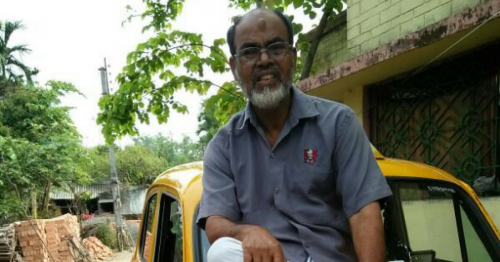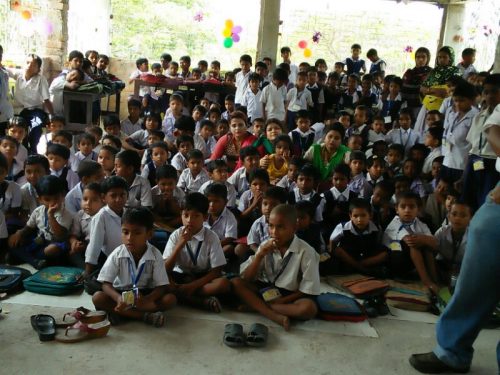He relies on his own savings and donations from passengers.
Seven-year-old Gazi Jalaluddin studied at the local village school. A studious kid, he was jumping with joy to tell his father that he had stood first in class 1. But his father had news of his own—he was unable to gather enough money to buy him books for class 2 so Gazi would have to stop going to school.
Gazi’s father was a farmer in Thakurchak village, located in the Sundarbans, West Bengal. He just had a quarter acre of land, which did not give enough yield to return even the inputs, sometimes leaving the family starving for days. Hoping for better prospects—maybe one meal every day—the family moved to Kolkata. However, Gazi’s father was unwell and no one would hire him. Before long, Gazi ended up begging in the streets of Kolkata. However, the hard worker got work as a rickshaw-puller when he was 12 or 13 and by the time he was 18 he learned to drive. He became a taxi-driver in 1977.
Yet, he never forgot his village and the underprivileged children who lived there. So, he formed the “Sundarban Driving Samiti” and started giving driving lessons to the young boys of the Sundarbans so they could start living their lives with dignity.
“I taught 10 boys in my first class for free and asked them to donate just ₹5 every month once they started earning. I also asked each one of them to teach two more needy boys from the village. The chain still continues and today, there are 300 boys from the Sundarbans driving taxis and earning their living in Kolkata,” says Gazi.
In addition to this initiative, Gazi also started asking his passengers if they wanted to donate books, medicines or old clothes for destitute villagers. Many people did do so and Gazi made sure they reached needy people in the village. Many kids who, like Gazi, had to leave studies due to lack of money to buy books were able to study again with his help.
Without any help from the government, this school dropout was now giving free education and a meal to underprivileged kids.
This did not discourage him and he started his school in one of the rooms of his two-room house. He would go around the village with a mike, announcing that classes were on and he’d teach kids for free. Initially no one was interested because they didn’t see how it could make a difference in the long term.
“They were not ready to send their kids, especially girls to school. I explained to them how they have to run back to the doctor or a literate person to read even simplest things, like how to take medicines. Even urgent letters went unread until someone could be found to decipher them,” he says.
Gazi’s efforts paid off and he started his school, Ismail Israfil Free Primary School (named after his two sons), with 22 students and two teachers in 1998 in Uttar Thakurchak, Sundarbans.
He then kept building one room every year with donations offered by his passengers and with his savings. By 2012, Gazi managed to build 12 classrooms, 2 washrooms and a mid-day meal room in his school. Without any help from the government, this school dropout was now giving free education and a meal to underprivileged kids.
Two of Gazi’s passengers helped him to buy land for the school, some took the responsibility to pay the teachers and some helped him to start the mid-day meal in his school. With help pouring in, he was able to build his second school, Sundarban Sikshayatan Mission, in 2009 in Purv Thakurchak, Sundarban, 2km from his first school. Now, there are around 21 teachers, four non-teaching staff and nearly 425 students in these two schools.
Gazi did not stop here. Many of the students in his schools were orphaned children who were forced to beg just like Gazi did. He wanted to provide shelter to these kids and began to collect funds for an orphanage. More people pitched in and the Sundarban Orphanage Mission was built in 2016. He arranges all the residential requirements of these children by using donations and by saving money from his earnings. Gazi especially thanked Arun Kumar Dubey who donated land for his orphanage, Dipankar Ghosh, Ajeet Kumar Saha, Deepa Dutta, Barnali Pai and many others who are helping him to sustain the schools and the orphanage.
At The Better India, we are constantly in search for people, projects and organizations that are making a positive impact to the lives of others. Read about many similar changemakers here.
Article Source: HuffPost


